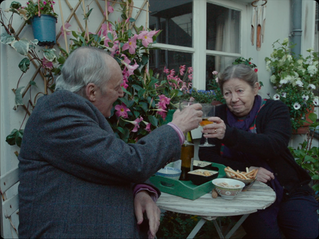It Happened One Night
- Lauren Mattice
- May 17, 2022
- 3 min read
Frank Capra, 1934

While Frank Capra’s seminal It Happened One Night is heralded as a classic and forebearer of later screwball and romantic comedies, its cultural commentary on the disparities laid bare by the Great Depression is inseparable from its main vehicle as a journey film.
Adapted from the short story “Night Bus” by Samuel Hopkins Adams, the film follows heiress Ellie Andrews and her cross-country escape from her overbearing father Alexander after she marries the “phony” socialite King Westley . Along the way, Ellie meets the recently fired newspaper man Peter Warne , a silky and dry talent who helps her flee in a series of wacky road scenarios kept privy to Ellie in her secluded, wealthy upbringing.
The narrative works so brilliantly because of its leads’ ability to adapt and change. Ellie, who recklessly spends her last dollars trying to buy chocolate, admits to never eating raw carrots, and initially escapes her father by jumping off a yacht, plays between resistance to Peter’s everyman charms and an outpouring of generosity to show this flexibility.
On the one hand, Colbert’s comedic ability is marked by snappy quips to Gable’s brashness or in bodily cues such as a lift of the chin or roll of the eyes to Peter’s lower-brow antics. In another instant, Ellie is brought back down to Earth, giving the rest of her money to a boy with a sick mother traveling on the bus with them, an all too quick reaction to a situation assumedly never put before her.
This is not to say that generosity like this is unrealistic or a blight on the story’s ability to speak to different classes of people. What it does instead is shrink the spectrum of economic disparity from its real distances in the Great Depression in favor of the romantic-comedy plot, or as historian Bernard Dick wrote, “a movie in which romance, social differences, political conversion, and the triumph of goodness coalesced into a myth of America.”
Ellie is distinctly marked by the purpose of her journey: the escape from her father’s grasp. It is one taken spontaneously with no real safety net besides King Westley on the other side, and abandoned when she thinks Peter has left her just before reaching New York. Despite her troubles of losing her money, having her bag stolen, sleeping outside, and more hijinks played to comedy, they are ultimately fixable and temporary.
While Ellie believes the power is not in her favor, despite several displays of monetary prowess to the contrary, Peter plays to the opposite for his pride. He teases his boss with telegrams of his journey and epithets his stupidity all while his journey is one of redemption, to get his livelihood back. He is closer to the boy on the bus whose mother spent all of their remaining money on a last-ditch journey to New York for a job that might not even be there — but for the film to work as a romantic comedy and for Ellie and Peter to reverse the trope of the “damsel in distress,” this distance cannot be expatiated on.
Instead, we see glimpses of his working-class knowledge in the motels or while hitchhiking. They’re inserted as one-time lessons on how to get out of a quick jam rather than illustrations of survival in the Depression-era. Ironically, these are some of the most popular and famous scenes but remain still one-offs to laugh about and move on from.
Money is on the other side of this journey to save both Ellie and Peter, and it shifts the film away from the realism of road movies to come and toward the unity of the feel-good genres of comedy and romance that it would later heavily influence.








Comments